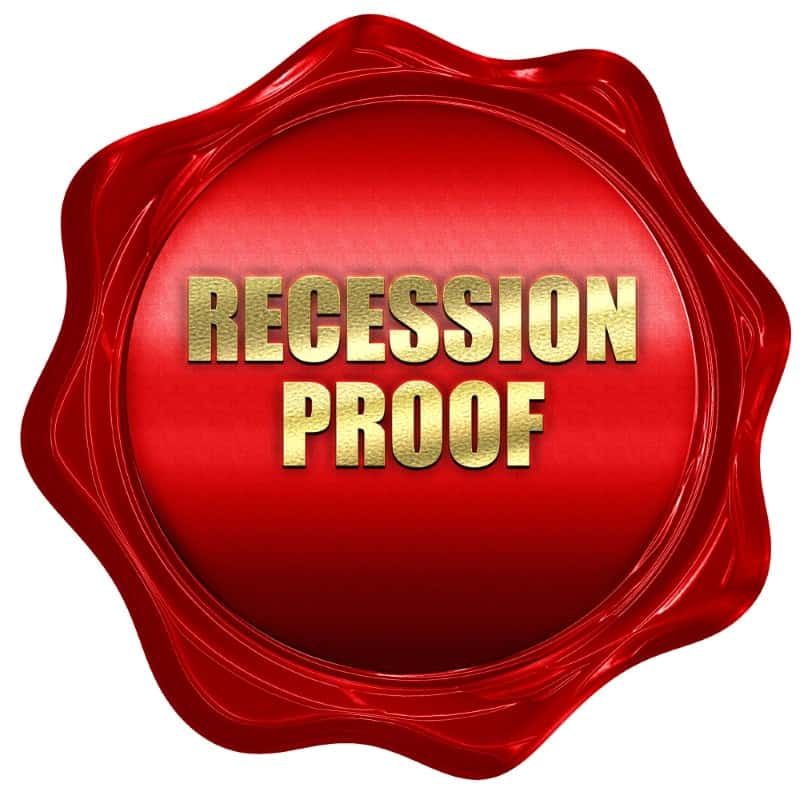6 Best Recession-Proof Jobs With Good Salary

We all want a job that pays well, gives our life meaning and lets us do something useful. However, job security is also vital to long-term growth and increasing our average net worth, which means working in a recession-proof field.
If the past few years have taught us anything, some jobs are built to last and can withstand any economic downturn. It can unquestionably influence the field of work that we choose to go into.
So, what are recession-proof jobs, and what aren’t? Here’s a look at some of the top recession-proof jobs.
What Does “Recession-Proof Jobs” Mean?
Recession-proof jobs provide job security, even in the most turbulent economic times.
To be clear, no job – no matter how useful – is recession-proof. All jobs are unquestionably impacted by the broader performance of the economy as a whole, as are potential opportunities to advance later down the line.
However, there is no doubt that some jobs do better in down economic times than others. Furthermore, some jobs will continue to expand, have value, and have a need – even if the economy crashes. Such jobs are known as recession-proof jobs. There are many reasons that a job may be recession-proof, including:
- They occupy such an essential role in our society that they can survive any economic downturn.
- People tend to prioritize their money so that the job can survive an economic downturn.
- The occupation works in a field that is disconnected from total financial performance.
The best recession-proof jobs typically occupy multiple of the above factors. However, even the most recession-proof jobs will have moments where external factors may threaten their long-term viability.
Government Jobs
These jobs are only partially immune from a recession. Still, often, governments face situations where they must continue to perform their duties, even if it means doing uncomfortably or long-term fiscally imprudent decision-making.
A great example of this phenomenon is law enforcement officers, corrections officers, and others that deal with attempting to control crime rates.
There is no question that law enforcement officers have an essential role to play in our society. Not only are they needed to keep the police and expect the citizenry, but even in times of economic turmoil, people are typically willing to pay for police officers.
This explains why a field in public safety is in such high demand: The need for the service, and the political pressure to support such a service, will always exist.
Of course, that isn’t the only government position that is often regarded as able to survive economic downturns. The job market for other law enforcement workers, probation officers, corrections workers, public transportation workers, utility workers, home health aides, waste management employees is usually robust.
We are not only dealing with a shortage of these positions but even in the best circumstances, government workers are needed. Many governments can raise taxes to pay for critical services, although the support for doing so during a recession may be more limited.
It is also worth noting that traditional relationships between the economy’s performance and spending don’t exist for governments.
When a recession hits, it usually hits government revenue later, giving the government some additional wiggle room to try and shelter against a downturn.
Furthermore, some government units – like the federal government – can borrow or print money. It means they may not need a balanced budget, giving government workers excellent job security.
As such, federal government employees and other federal agents are usually not directly impacted by a recession. It helps to do any job with the federal government, one of the best recession-proof jobs someone can have.
Finally, there are some exceptions to this rule. Some jobs are still highly likely to be lost during a recession, as revenue declines eventually catch up with government funding sources resulting in cuts and layoffs.
Unfortunately, some jobs are more likely to get laid off than others. For example, jobs that deal with arts, culture, and mental health are often the first to go when the government does make job cuts. This helps explain why social workers are often fired during recessions.
- Law enforcement workers
- Probation officers
- Corrections workers
- Public transportation workers
- Utility workers
- Waste management employees
Health Care Sector
The healthcare sector is an industry that is of such vital importance that it is relatively recession-proof. During a recession, jobs that manage health care may see dents to their job security. This is particularly likely to be the case for people who cannot afford health care or those who engage in more “discretionary” health care procedures, like plastic surgery.
However, health care is always going to be needed. The combination of government assistance and insurance providers is enough to keep the healthcare industry relatively functioning, particularly given the overwhelming need that people will have. As a result, healthcare jobs are usually considered to be recession-proof, regardless of the economic climate.
What does this mean? Doctors, nurses, and related fields are usually safe. So are senior care workers, physical and occupational therapists, hospital administrators, home health aides, hospice workers, data analysts, and other jobs that deal with health care. Economic recessions cannot touch this area.
There are other examples of recession-proof healthcare jobs that do not directly impact the lives of humans. Take the field of veterinary services and those that help maintain the health of our four-legged family members.
If people have pets, they will need to maintain the health of their pets, and pet owners tend to be pet lovers, willing to do whatever it takes to keep their beloved family members healthy. As such, veterinary services still survive during recessions.
However, like everything else on this list, this isn’t to say that there will be no impact on the veterinary sector during recessions. These periods typically see fewer adoptions as people become less willing to adopt animals. The reason for this is simple and obvious: People become much more fearful that adopting a pet will impact their finances.
Unfortunately, in some cases, people will give up their animals due to hits to their personal finances. Fortunately, this doesn’t happen often, and it’s usually not enough to reduce the need for veterinary services.
- Senior care workers
- Physical and occupational therapists
- Hospital administrators
- Home health aides
- Hospice workers
- Vets
- Data analysts and other jobs that deal with health care.
Funeral Directors
It may not be thought of in the field of recession-proof jobs, but working for a well-regarded funeral home can provide you with good job security. The reasoning is simple: People still die, no matter the economic circumstances! As such, working funeral workers often find that they can still do business successfully during economic and financial turbulence.
Again, like above, that’s not to say that an economic recession doesn’t ultimately impact the field of funerals and death. During these times, people may be much more cost-conscious about how they bury their loved ones and deal with someone’s final resting place.
Individuals and families become much more likely to choose less expensive options, select less-lavish coffins, and have smaller receptions after a funeral. This will impact the bottom line of a funeral home and may result in less expansion and profit, as well as fewer job openings.
However, given that the need will still exist during these times, funeral workers are usually regarded as relatively recession-proof jobs.
Legal and Tax Profession
Anything connected to the legal profession still does relatively well, even during high financial turmoil. The reasoning is pretty simple: legal professionals will always be needed.
Even in tough economic times, law firms usually see steady employment, although there are unquestionably threats to the job prospects of some lawyers during this time. The exact nature of these threats depends on the specific economic conditions of the moment.
The demand for legal services will always exist. People will always need wills done and revocable living trusts set up. Businesses will still open and close. Crimes will still happen, meaning people will still need to hire criminal defense lawyers.
Some specific areas of the legal profession may do exceptionally well during times of economic crisis. Bankruptcy lawyers are a great example of this. Like other times of financial stress, the great recession saw a massive increase in the number of businesses that closed and the number of people and companies that declared bankruptcy. There was an increased demand for lawyers dealing with bankruptcy and the end of companies.
Divorce lawyers may also see booming business during a recession. Stress levels skyrocket during a recession, and couples become more prone to fight over dwindling pools of money.
Indeed, these stress factors are typically among the higher reasons marriages disintegrate, which happens during a period of high economic stress. As a result, the demand for the services of attorneys that deal with divorces increases.
It also explains why some housing types – like apartment rentals – often do relatively well during these periods.
Tax returns need to be filed with the IRS even in a recession. Tax strategies for businesses become a more valuable cost-saving measure during a downturn
- Bankruptcy lawyers
- Divorce lawyers
- Paralegals
- CPA
- Tax accountants
- IRS enrolled agents
Education
Regarding recession-proof jobs, education can be a double-edged sword, and there is no question that all fields of education are not hit equally by a recession. However, the good news is that education is a more recession-proof field than most.
There are many reasons why this is the case.
First is obvious: Even in recessions, kids need to be educated. As noted above, governments can raise revenue in a way that can be separated from the rest of the economy.
Furthermore, most people acknowledge the overwhelming importance of education, keeping these jobs in high demand and making teachers one of the better education-proof jobs that someone can work in.
There is an ongoing shortage of people willing to work in the teaching field, which also increases the pressure for people to work here.
However, like all supposed recession-proof jobs, there are exceptions to every rule. Higher education is one such example. The field of higher education is not usually regarded as one of the recession-proof jobs that someone can get.
During recessions, enrollment in the field of higher education tends to fall. The economic incentives to get a four-year degree don’t exist to the same extent as they once did, mainly when the economy is down, as many people skip school and jump directly into the workforce. The past few years have already seen this field suffer, and recessions will unquestionably have a disproportionate impact in this area.
Early childhood education is another field with more of a mixed bag during economic turmoil. On the one hand, the area is somewhat recession-proof. After all, as long as people work anywhere, they will need someone to watch and educate their young children.
However, when someone loses their job – which happens during recessions – one of the first things they will do to save money is pulling their kids out of their early childhood education facility. This reduces the demand for early childhood education and may depress the entire industry.
- Teachers
- Administrative staff in schools
Some Service Industry Professions
Recessions often inspire people to cut out unnecessary services and reevaluate where they spend their limited money. Indeed, these jobs tend to be among the first to go when people are more worried about their financial future.
However, that doesn’t mean that all service jobs will be eliminated during a recession. Indeed, these jobs are vitally necessary in many cases and provide services that individuals cannot live without.
There are many examples of services without which people cannot survive in modern society. Some examples include:
- Grocery store employees
- Auto mechanics
- Utility workers
- Bus drivers
There is a wide range of positions, but as you can see, they have one thing in common: In some form or another, given the current makeup of our society, these positions will be recession-proof.
However, they may not be future-proof. Cars are becoming increasingly automated, and this may reduce the need for bus drivers in the future.
More and more people are relying on the internet to purchase groceries. Working as a grocery store employee may not always be in high demand.
In fact, will robots take my job with automation is a constant fear.
This brings up the final point: Recession-proof is excellent. But the future proof is better.
The job market is constantly changing to reflect modern society’s needs. As such, you may not want to consider what job will get you through a recession but what job won’t be automated in the future.
It can be challenging to determine, of course. However, it is an added consideration.
Should You Protect Yourself With Recession-Proof Jobs
So, what’s the final career advice? Should you pick a job based on one likely to survive during economic uncertainty? After all, job stability is a hugely important factor in a job search.
Recession-proof jobs will always be in demand and must be part of anyone’s career selection decisions. However, just because a job is recession-proof doesn’t mean that the industry won’t be impacted, in some way, by a recession.
Every downturn is also different, which makes investing during a recession hard. During the dot-com recession, the technology industry was decimated. And during the Great Financial Crisis, many financial firms bore the brunt while the technology sector was fine and, in fact, resulted in the creation of several moonshot companies.
Recession-proof stocks exist in industries that typically do not offer career growth. Several industries may not be as recession-proof, but they may have other benefits, including a seven-figure salary that recession-proof jobs cannot match.
As such, keep all the above factors in mind, but don’t let a job’s relative recession-proof standing be the final impact. Economic stress is a nightmare, but working in bad sectors worsens mental health.
One solution could be to work in growth sectors dependent on economic conditions. Yes, the job might not be safe in a downturn, but hopefully, you have a side hustle that takes care of your living expenses portion of your budget.
Besides, although improving human capital can help obtain financial independence, one rarely becomes a billionaire working a job.
Of course, the best side hustle should combine your high-income skills and your current job or hobby. Create an online business related to your CPA skills if you are a CPA. Although software programming might be lucrative, you would need to spend a lot of time and effort to become an expert.
Due to the low cost of starting a website, your downside is limited compared to starting a physical business. You can start today as a side gig without interfering with your primary income source.
Pick a topic or niche related to your day job (so you already have the skills). Or your hobby so that your passion will continue to inspire others.
Start a website in 10 minutes and post at least once a week. Grow your audience and develop your true 1000 fans.
After the initial work on generating content in the form of an e-book, blog posts, courses, etc., your website will be one of the best investments for monthly income.
.

John Dealbreuin came from a third world country to the US with only $1,000 not knowing anyone; guided by an immigrant dream. In 12 years, he achieved his retirement number.
He started Financial Freedom Countdown to help everyone think differently about their financial challenges and live their best lives. John resides in the San Francisco Bay Area enjoying nature trails and weight training.
Here are his recommended tools
M1 Finance: John compared M1 Finance against Vanguard, Schwab, Fidelity, Wealthfront and Betterment to find the perfect investment platform. He uses it due to zero fees, very low minimums, automated investment with automatic rebalancing. The pre-built asset allocations and fractional shares helps one get started right away.
Personal Capital: This is a free tool John uses to track his net worth on a regular basis and as a retirement planner. It also alerts him wrt hidden fees and has a budget tracker included.
Streitwise is available for accredited and non-accredited investors. They have one of the lowest fees and high “skin in the game,” with over $5M of capital invested by founders in the deals. It is also open to foreign/non-USA investor. Minimum investment is $5,000.
Platforms like Yieldstreet provide investment options in art, legal, structured notes, venture capital, etc. They also have fixed-income portfolios spread across multiple asset classes with a single investment with low minimums of $10,000.







Good post. I don’t think people ever look at how many jobs there is working for the state or local city. Local government is still having a hard time finding people to fill their jobs. It’s amazing how good the benefits are and the retirement is top notch. You can move around and work your way up the ladder no matter what your job is. You can also get your tuition paid for. How good is that.
Yes, I know a few friends who for University of Berkley and are full time real estate agents with client showings during work hours. The risk of getting fired is so low and they have union protection.